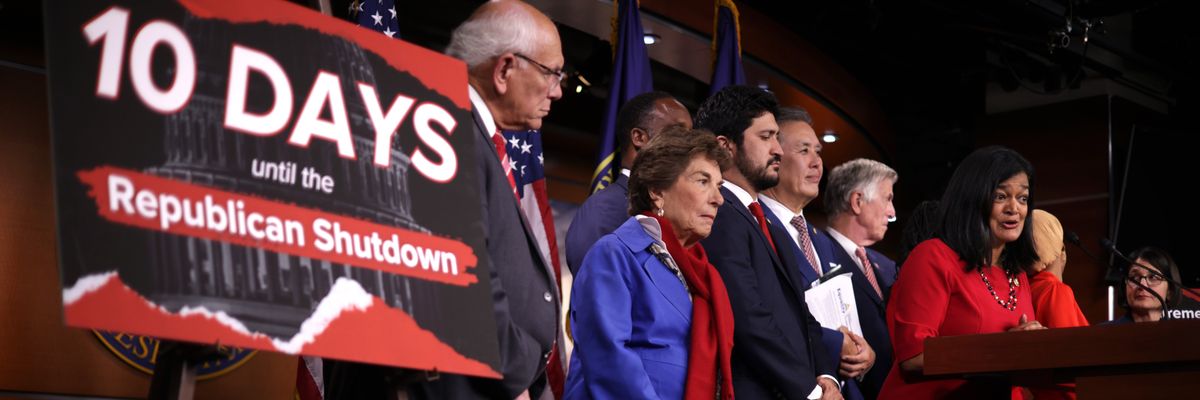Just 10 days away from a potential U.S. government shutdown, calls for bipartisan action to prevent it are mounting, as is outrage over Republicans in the House of Representatives who seem content with causing chaos.
"What we want is simple: No cuts. No layoffs. No shutdown," Congressional Progressive Caucus (CPC) Chair Pramila Jayapal (D-Wash.) said at an afternoon
press conference. She described the "Republican shutdown" as "a ticking time bomb," and called out the GOP—particularly House Speaker Kevin McCarthy (R-Calif.)—for lighting the fuse.
"And who loses from these absurd, delusional political games? Working- and middle-class families will suffer," Jayapal stressed. In addition to some CPC members, she was flanked by signs calling out McCarthy and warning that MAGA Republicans are trying to pull teachers out of classrooms, kick kids out of preschool, and slash funding for food aid.
Far-right House Republicans this week have
refused to support a McCarthy-backed continuing resolution (CR) that would prevent a government shutdown for a month. The measure contains provisions also opposed by congressional Democrats and President Joe Biden—including spending cuts that conflict with the Fiscal Responsibility Act, the debt limit deal Biden struck with McCarthy earlier this year.
In a Wednesday
letter to McCarthy arguing that "the time has come to end partisan posturing and put forward a viable path to funding our government," 92 members of the CPC noted that the GOP has pushed for betraying the debt ceiling deal.
"We stand ready to support a bipartisan funding vehicle free of poison pill policy riders that is consistent with the agreement you struck with President Biden and which was ratified by bipartisan majorities in both the House and Senate," they wrote. "If you choose not to pass a bipartisan government funding bill consistent with the Fiscal Responsibility Act, you are deliberately choosing to shut down the government."
"We can look to the Senate for an example, where senators achieved bipartisan consensus on funding and policy for all 12 of its appropriations bills," the CPC members continued. "In contrast, your House majority has been unable to pass the vast majority of its own hyper-partisan appropriations bills, despite the inclusion of extreme policy riders and draconian spending cuts designed to accommodate the far-right faction of your conference."
The CPC was far from alone in calling out the GOP on Wednesday. The Biden White House
said in a lengthy statement that "extreme House Republicans are consumed by chaos and marching our country toward a government shutdown that would damage our communities, economy, and national security."
The White House highlighted impacts of the looming shutdown, from endangering disaster response and delaying infrastructure projects to undermining medical research, food safety, and environmental and public health protections.
"These consequences are real and avoidable—but only if House Republicans stop playing political games with people's lives and catering to the ideological demands of their most extreme, far-right members," the White House added. "It's time for House Republicans to abide by the bipartisan budget agreement that a majority of them voted for, keep the government open, and address other urgent needs for the American people."
Lee Saunders, president of the American Federation of State, County, and Municipal Employees (AFSCME)—the nation's largest trade union of public employees—also
called out "anti-worker politicians in Congress" for "going back on their word."
"They are demanding drastic cuts to the essential programs millions of families need to survive—food, housing, education, and more," he said. "And to get their way, they are using the threat of a government shutdown, which would jeopardize the livelihood of frontline federal employees as well as their families, while pausing lifesaving programs for millions of people nationwide."
"All this to appease their corporate megadonors, who care about little else besides receiving massive tax cuts," Saunders emphasized. "Extremists in Congress need to stop using our lives as bargaining chips. It's time for them to follow through on the promises they have already made to keep the government open."
The current GOP-caused chaos on Capitol Hill was arguably predicable. As Chris Lehmann
wrote Tuesday for The Nation:
Today's shutdown battle involves little in the way of clear policy objectives beyond McCarthy's rapid capitulation to far-right House demands to
launch Biden impeachment inquiries and the perennial demand for more draconian measures to police the U.S. southern border. "In many ways, the shutdown is the goal," says Princeton University historian Julian Zelizer... "Meaning, to create chaos and dysfunction has become an animating goal for the GOP, which makes negotiation much harder to achieve even within the party."
[...]
Across the past quarter-century of Republican-engineered shutdowns, the clearest lesson is that the triumph of procedural nihilism only ensures that things will get worse. Since this budget bloodsport launched in 1995, Zelizer says, "we have seen a continual ratcheting up of what the GOP is willing to do: shutdowns, debt ceiling threats, and the rest are all part of the new normal. McCarthy... accepts this and agreed to rules that made these forces stronger than ever."
Given those conditions, "small groups of centrist Democrats are holding secret talks with several of McCarthy's close GOP allies about a last-ditch deal to fund the government,"
Politico reported Wednesday, citing over a half-dozen people familiar with the discussions.
"Generally, the bipartisan group is focusing on two major ideas: a procedural maneuver to force a vote on a compromise spending plan—or somehow crafting a bill so popular that McCarthy can pass it and survive any challenge from the right," according to the outlet. "That bill would likely be a bipartisan short-term patch with some disaster money, Ukraine aid, and small-scale border policies."
In the meantime,
Punchbowl News' John Bresnahan reported after House Republicans' Wednesday afternoon meeting that "the current thinking in House GOP leadership" is that the chamber should focus on a defense bill Thursday and Friday, then pass a new CR Saturday.
Then, the Senate could take up the CR, amend it, and send it back to House, which "will take several days" and "sets up shutdown drama for [the] following weekend," he explained, stressing that "this is all very fluid."
On the Senate side, Majority Leader Chuck Schumer (D-N.Y.) said Wednesday that "House Republicans rejected their own extremist bill, and by rejecting it, that's a dead giveaway they're not serious about avoiding a shutdown."
"Speaker McCarthy says he wants to avoid a shutdown, he says nobody wins in a shutdown," Schumer added. "Well, then he should reach across the aisle to find an agreement that actually has the votes to pass both chambers. That's the only way—the only way—this crisis gets resolved."
This post has been updated with comment from Senate Majority Leader Chuck Schumer (D-N.Y.) and the Groundwork Collaborative.




